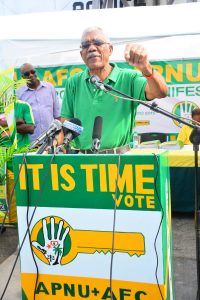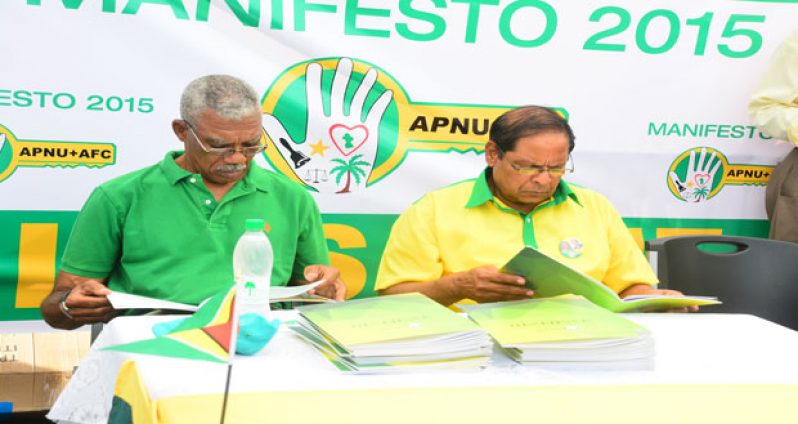TAKING their pact with Guyanese straight to the people at the famous Stabroek Market Square yesterday afternoon, the A Partnership for National Unity + Alliance For Change (APNU+AFC) coalition launched what has been described as their ‘war manifesto’, aimed at “fighting” six major wars allegedly plaguing Guyana. Presidential candidate of the coalition, Brigadier (rtd) David Granger described the document as “A people’s Manifesto”, which was birthed out of the six-party coalition and aimed at fighting six major wars in the country.

The issues he outlined, were: The war against poverty; the war against disunity; the war against crime; the war against dictatorship; the war against cronyism; and the war against corruption.
POVERTY
Addressing a gathering of a few hundred, Granger disclosed that the first war which is to be fought is that against poverty. According to him, too many people in Guyana arecurrently below the poverty line which is a result of poor management rather than the lack of resources.
“This poverty has come about not because Guyana is a poor country” Granger noted, while adding that the People’s Progressive Party (PPP) are keeping Guyana in a state of poverty.
“We have more resources than any country in the Caribbean. So we have to deal with poverty and this manifesto will tell you how to deal with poverty,” he said.
DISUNITY
Suggesting that the ‘National Unity’(NU) in the APNU is the basis for the six-party coalition ahead of the elections, Granger explained that disunity is the key factor which has prevented Guyana from developing over the last few years.
When the AFC opted to form a joint alliance with the APNU on February 14, this was a demonstration that we were willing to put disunity behind us. “When APNU and AFC came together, we were committed to providing a forum for national unity,” he added.
CRIME
Lamenting the current state of affairs as it relates to crime in Guyana, the presidential hopeful related that the war against crime which the manifesto has detailed is one which is to be treated with urgency. He noted that issues related to piracy, banditry, wife murders, traffic fatalities, gun running and narco-trafficking have all found a place to be addressed in “the people’s manifesto.”
DICTATORSHIP
According to Granger, the manifesto is also aimed at fighting the war against dictatorship. In this regard, he alluded to the fact that incumbent President Donald Ramotar had prorogued the 10th Parliament subsequently dissolving it, which he (Granger) is of the opinion could not happen in any country sitting in the western hemisphere.
“You gave us the majority in 2011; you gave us 175,000 votes in 2011,” he told members of the public, adding that compared to the 166,000 votes the PPP would have received, the Coalition’s representation was that of a majority of Guyanese. But this majority he hinted was one which the PPP “refused to accept.”
“They refused to give us local government elections. We have a plan to ensure that dictatorship is banished from this land,” an adamant Granger told the public.

CRONYISM
The APNU+AFC leader further suggested that Guyana was plagued with the issue of cronyism which their manifesto was capable of combating. In issuing contracts for public facilities, Granger suggested that “instead of giving efficient and competent contractors, they [the PPP]give it to friends and families” which was the manifestation of cronyism.
As such, the APNU+AFC’s manifesto will seek to eliminate cronyism by establishing a Public Procurement Commission responsible for the awarding of contracts. “We will make sure if you are living in Sophia or Mahdia, you will get a road that will be a good road; so down with cronyism” a hyped Granger told his supporters.
CORRUPTION
The final war that the manifesto will seek to fight is that against corruption, Granger disclosed. Corruption as it is, according to the APNU+AFC’s presidential candidate, is “eating the heart out of this country.”
Relating experiences of meeting people in the Diaspora, he told the gathering that there are people who wish to return to Guyana, but are skeptical of the “crime and corruption.”
According to him, citizens want to have a level playing field; they want to be treated fairly. “By treating your public servants so badly, giving them poor wages, you force some of them to do things which are unethical” he said, while adding that the country has good policemen and should his government be elected on May, 12,he will establish a commission to review their salaries.
Charging Guyanese to read and examine the policies in their manifesto, Granger reiterated that “this manifesto is about the war against crime, a war against corruption, a war against cronyism, a war against poverty, a war against disunity and a war against dictatorship,” which will lead people into the future and make Guyana a better place.
RESTORATION
Similar sentiments were expressed by prime ministerial candidate of the coalition, Moses Nagamootoo, who promised the gathering that the first thing the coalition has in store for Guyanese is “the restoration of open and accountable governance.”
This he opined, underlines the manifesto and its policies and programmes which will aid in bringing about an “open society.”
“At the bottom-line of all that we have planned in this manifesto, is how to be able to end discrimination; how to be able to end marginalization; how to be able to end exploitation of our people and how to be able to bring all of our people together as one Guyanese nation coming together for a common goal,” Nagamootoo related.
Rubbishing claims of replication, the prime ministerial candidate assured Guyanese that the coalition “did not copy anyone” in the drafting of this document. They are “original” ideas rather, which will “take this country forward and resolve the problems of corruption, the problems of crime, the problems of low wages and demoralization among working people and also to take care of the many jobless in our society.”
Included in the manifesto, he explained, are both short- term goals which are to be achieved within the first 100 days of office and more extensive plans which are part of a five- year plan.
Hinting at some of the short-term plans, Nagamootoo disclosed that within 100 days of assuming office, the coalition intends to, inter alia, implement the programmes to bring you new elections, constitutional reforms and to bring about a procurement commission.“It is the manifesto that has everything for everyone,” he reiterated.
JOINT EFFORT
Weighing in on the single most important document from APNU+AFC, which plays a critical role in magnetizing voters in the lead up to elections, both general secretaries of the major parties forming the coalition, Joseph Harmon of the APNU and David Patterson of the AFC agreed that the manifesto was a joint effort by both the partnership and the alliance.
Harmon detailed that there was no single approach to the policies or programmes forming the contents and sectors were not individually addressed, but were examined through a “joint approach.”
Patterson agreed, suggesting that their manifesto has outweighed that of the PPP’s in that its approach is geared more towards benefiting “the ordinary people.”
“The wage increases for public servants, better benefits for the youths and more jobs for the youths. It’s a unity document; it’s a manifesto to unite our people,” Patterson said.
Earlier this week, a softcopy of a document described as the manifesto had surfaced on social media, appearing on popular local news site, ‘Demerara waves.’ However, subsequent to the “leak,” a statement released by former President Bharrat Jagdeo which reportedly “shredded” the coalition’s manifesto resulted in the coalition issuing a statement informing members of the public that the “leaked”document was not the coalition’s manifesto.
The APNU+AFC plan also has as its central themes: Healing and reconciliation; Governance; Constitutional Reform; Public Safety and Security; Women and Gender Equality; Youth Policy; Education; Health and Nutrition; Housing Policy; Sports and Recreation; Cultural Policy; Natural Resources and the Environment; Agriculture; Hinterland Development; Tourism; Information & Communication Technology; Income Distribution; and Foreign Relations.
By Ravin Singh





.jpg)








